Politics
Donald Trump’s policies could add twice as much to US debt as Kamala Harris’: study
Published
6 months agoon
By
Ekwutos BlogChina-targeted tariffs by former American president would lead to significant revenue loss plus ‘economic and geopolitical repercussions’
Former US president Donald Trump‘s tariff plans, including additional duties on Chinese imports, could offset US$2.7 trillion of American debt in the next decade but could also trigger revenue loss with “geopolitical repercussions”, a study has found.
Trump’s fiscal proposals could add twice as much to the national debt compared to plans under US Vice-President Kamala Harris, according to a report by the Committee for a Responsible Federal Budget, a Washington-based non-profit group, on Monday.
Policies under the Republican standard-bearer, who has proposed further tax cuts for corporations and replacing individual income tax with tariffs, could add to the US budget deficit by up to US$15.15 trillion compared to US$8.1 trillion under his Democratic opponent’s plans, the non-partisan group said.
Do you have questions about the biggest topics and trends from around the world? Get the answers with SCMP Knowledge, our new platform of curated content with explainers, FAQs, analyses and infographics brought to you by our award-winning team.
Trump has long advocated the idea of imposing high tariffs on US imports, arguing they could create jobs domestically and shrink the federal deficit.
Since launching his 2024 bid for the White House, the former president has proposed a 10 or 20 per cent universal tariff on all imports as well as 60 per cent duties on Chinese goods.
A 10 per cent universal tariff could raise US$2.5 trillion for the American economy, the report found, or up to US$4.30 trillion if Trump goes with a 20 per cent tariff. But either amount would fall far short of making up the costs of his other fiscal policies.
In addition, his tariff plans could lead to significant revenue loss, plus “economic and geopolitical repercussions”, especially with additional duties imposed on Chinese goods.
Trump during his first term as president took aim at Beijing with tariffs on more than US$300 billion worth of mainland imports, most of which remain in effect.
On the campaign trail for the November election, he has vowed to double down with more tariffs if re-elected, accusing the world’s second-biggest economy of being responsible for a large trade deficit with the US while “stealing” American jobs.
One of Trump’s prime targets is electric vehicles, having described them as a “green new scam”. At a rally in Wisconsin on Sunday, he threatened to impose tariffs as high as 200 per cent on Chinese EVs imported from Mexico.
EVs made on the mainland already face 100 per cent tariffs under US President Joe Biden, who said the product has undercut America’s manufacturing industry.
The Biden administration has also promoted a narrative of Chinese manufacturing being at “overcapacity”, urging American allies to address the challenge too.
Last week, the European Union voted in favour of additional tariffs of up to 35 per cent on Chinese EVs from November after initial negotiations with China fell through. The two agreed to continue talks, with the latest one scheduled on Monday, according to China’s commerce ministry.
Beijing has slammed the moves by Western nations as “indiscriminate” and “unfair”, saying they disrupt global supply chains. It has retaliated by imposing export controls on critical mineralsthat are essential for making EVs.
The report’s findings follow similar research that has warned of negative impacts on the US economy should Trump’s proposed tariffs on China come to fruition.
In September, the Tax Foundation, a Washington-based think tank, estimated the 10 per cent universal tariff and 60 per cent Chinese import tariff would reduce US GDP by roughly 0.8 per cent.
Meanwhile, a report last month by the Peterson Institute for International Economics, another Washington-based think tank, asserted that Trump’s tariff measures would result in weaker economic growth, higher inflation and job losses.
If China opted to retaliate, it added, US GDP would fall by more than 0.2 per cent below the baseline by 2026 and inflation would rise by 0.6 percentage points in 2025.
More Articles from SCMP
Spirit of Hong Kong Awards: meet the company saving the planet one lunchbox at a time
Hong Kong developers to make nearly 18,000 new flats available to homebuyers
Philippines moves to define sea routes, strengthening sovereignty against China
Manchester City triumph, wild scenes in US, what happened overnight in the world of sport
You may like


Suspected kidnappers terrorizing Otukpo LGA apprehended


I did only traditional marriage. Pls Atanda, how can i get a marriage c£rtificate that will be acceptable at the £mbassy?


It’s wrong to check suspect’s phone – Ebonyi Police Commissioner
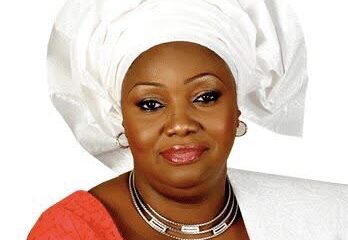

PRESIDENT TINUBU CELEBRATES DAME FASHOLA ON 60TH BIRTHDAY
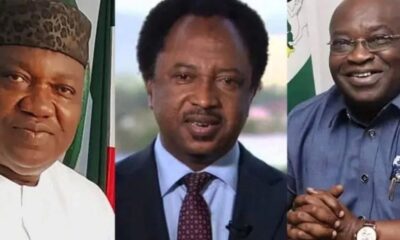

Ugwanyi, Ikpeazu, Shehu Sani, others screened for ambassadorial appointments
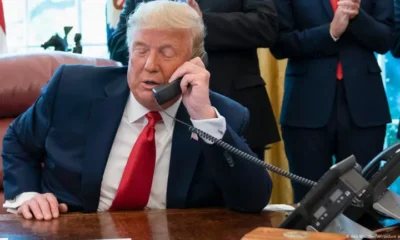

Trump tariffs: 50 nations seek new US trade talks — official
Politics
Ugwanyi, Ikpeazu, Shehu Sani, others screened for ambassadorial appointments
Published
3 hours agoon
April 6, 2025By
Ekwutos Blog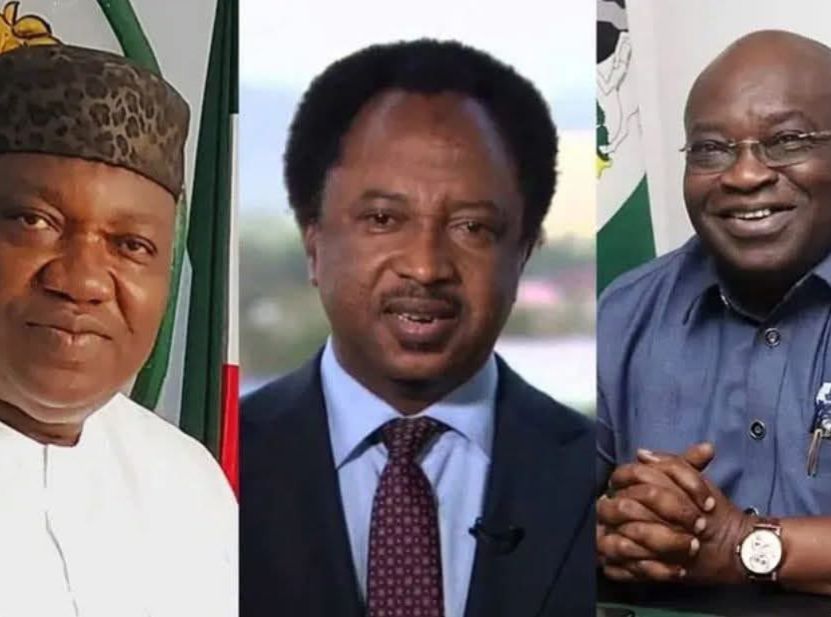
A reliable source disclosed to Ekwutosblog that two former south-eastern governors, Ifeanyi Ugwuanyi and Okezie Ikpeazu, have been screened for the role.
The source added that Shehu Sani, who recently joined the ruling All Progressives Congress (APC) and former presidential aide Reno Omokri, are among the nominees who have also been screened.
The source also confirmed that former Deputy Governor of Lagos State, Femi Pedro and former Minister of Aviation, Femi Fani-Kayode, have already gone through the screening process and have been cleared for their prospective national assignments.
It would be recalled that in September 2023, President Bola Tinubu recalled all Nigerian ambassadors, both career and non-career.
Politics
Trump tariffs: 50 nations seek new US trade talks — official
Published
5 hours agoon
April 6, 2025By
Ekwutos Blog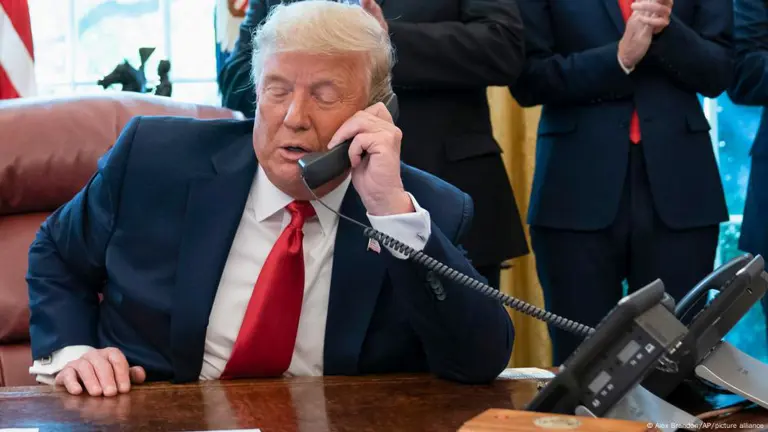
A senior advisor to US President Donald Trump said dozens of countries have contacted the White House seeking to renegotiate new US tariffs. Chip-making Taiwan says it wants to cut tariffs to zero.
Trump adviser: White House inundated with calls seeking fresh trade talks EU ready with “proportionate countermeasures,” says von der Leyen Netanyahu will urge Trump to cut tariffs on Israel during talks next week Chip leader Taiwan says it will seek zero-tariff deal with US
Here are the latest developments following the new round of Trump tariffs on Sunday, April 6:
EU’s von der Leyen warns bloc will ‘defend its interests’
European Union chief Ursula Von der Leyen said the bloc is prepared to “defend its interests with proportionate countermeasures” against Trump’s tariffs and will work with partners towards this end.
Von der Leyen, the President of the European Commission, the EU’s executive arm, issued a statement following a call with UK Prime Minister Keir Starmer, whose country has been hit by 10% tariffs.
The president also reaffirmed the EU’s “commitment to engaging in negotiations with the US.”
The Commission, which also coordinates the bloc’s trade policy, is due to propose to EU states on Monday a list of US products, worth $28 billion (€25.6 billion), to hit with extra duties.
The imports targeted include US meat, cereals, wine, wood and clothing, among other goods.
Those retaliatory measures are in response to Trump’s steel and aluminum tariffs rather than the broader reciprocal levies announced last week.
The 27-nation EU faces 25% tariffs on steel, aluminum and car exports and “reciprocal” tariffs of 20% from Wednesday for almost all other goods.
The new US tariffs will cover more than two-thirds of EU exports to the US.
On Monday, Luxembourg will host the first meeting of EU trade ministers since Trump’s sweeping tariffs were announced, where ministers are expected to push for a unified response.
Trump adviser: More than 50 countries want to renegotiate trade
Dozens of countries have so far reached out to renegotiate tariffs with the United States, a senior economic advisor to US President Donald Trump said.
National Economic Council Director Kevin Hassett told ABC News that Trump’s tariffs had so far driven “more than 50” countries to contact the White House to begin trade talks.
Hassett also denied that Trump hoped the new tariffs would crash financial markets to pressure the Federal Reserve to cut interest rates.
He insisted there would be no “political coercion” of the US central bank.
In a Truth Social post on Friday, Trump shared a video that suggested his tariffs aimed to hammer the stock market on purpose in a bid to force lower interest rates.
US stocks tumbled by around 10% on Thursday and Friday, after Trump announced a new global tariff regime that was more aggressive than investors had been anticipating.
Welcome to our coverage
Thank you for joining us as we bring you the latest developments on US President Donald Trump’s sweeping tariff plan, that has sent shockwaves around the world.
As nations digest the impact of the punitive new levies, several leaders have spoken about the desire to cut their own tariffs on imports from the US.
Investors, meanwhile, are nervously awaiting the opening of financial markets on Monday, after large falls in stock prices late last week, following the announcement.
Politics
Peter Obi Is weak and Spineless , That’s why he couldn’t field any candidate for the November Anambra Election – Noble Eyisi (Former Unizik President
Published
6 hours agoon
April 6, 2025By
Ekwutos Blog
Peter Obi Is weak and Spineless , That’s why he couldn’t field any candidate for the November Anambra Election – Noble Eyisi (Former Unizik President)..
He Posted this on his X account 
This shouldn’t surprise anyone that knows Peter. ‘A man who stands for nothing will fall for anything’.
The upcoming November election should be a walk in the park for Obi if he decides to put a candidate forward but because he’s weak, he won’t. He wants to reap all the rewards but shun the hardwork.
Come 2027, the spineless man will talk about a ‘structure of criminality’; whereas he refused to take up the opportunity to build his own structure and define it the way he wants it to be.

Suspected kidnappers terrorizing Otukpo LGA apprehended

I did only traditional marriage. Pls Atanda, how can i get a marriage c£rtificate that will be acceptable at the £mbassy?

It’s wrong to check suspect’s phone – Ebonyi Police Commissioner
Trending

 Trending6 months ago
Trending6 months agoNYA demands release of ‘abducted’ Imo chairman, preaches good governance
- Business6 months ago
US court acquits Air Peace boss, slams Mayfield $4000 fine

 Politics6 months ago
Politics6 months agoMexico’s new president causes concern just weeks before the US elections
- Entertainment6 months ago
Bobrisky transferred from Immigration to FCID, spends night behind bars
- Entertainment6 months ago
Bobrisky falls ill in police custody, rushed to hospital

 Politics6 months ago
Politics6 months agoRussia bans imports of agro-products from Kazakhstan after refusal to join BRICS

 Politics6 months ago
Politics6 months agoPutin invites 20 world leaders
- Politics1 year ago
Nigerian Senate passes Bill seeking the establishment of the South East Development Commission.

